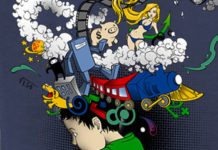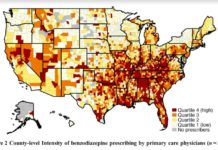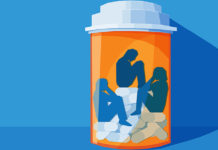Researchers Push Back Against Recommendation to Combine Antidepressants for Suicide Prevention
Researchers challenge the recommendation of starting two antidepressants simultaneously to increase preventative effects against suicide.
Researchers Highlight Pitfalls of Cognitive Assessment in Schools
Historical, current, and potential future complexities of cognitive assessment; a longstanding, controversial fixture in schools throughout the United States.
Dementia Screening Tools Often Misdiagnose Patients
A new study has found that the three most commonly-used dementia screening measures often misdiagnose patients.
7 Tips to Help a Distracted Child
Simple changes such as keeping a calm home environment, limiting media distractions and enrolling your child in sports will help a child who is inattentive or having problems focusing on his or her school work. They are also useful for any child and can even prevent inattentiveness in an ever-more-distracting world.
Researchers Recommend Diagnosing Social Adversity Rather than Individual Disorders
Already-existing ICD codes provide a diagnostic alternative to biomedical models of health by contextualizing suffering within psychosocial conditions, yet these codes are underutilized.
On Voice Hearing Simulations: Why They Should Be (Mostly) Banned
Voice hearing simulation exercises are designed to make participants feel frightened, overwhelmed, and unable to function. They don’t do anything to teach how people who hear voices work through that, the many effective strategies they use, or any of the benefits that some come to find in this way of being in the world.
Increasing Physical Activity in Schools May Improve Mental Health
A new article suggests integrating physical activity throughout the day may help to address the mental health of students.
7 Tasks for a Parent Whose Child Is Diagnosed with a Mental Illness
When I teach workshops or lead discussions on coming off psychiatric drugs and alternatives, there are invariably parents present who are at loose ends. They want to know how best to help their children, and how it can be possible for their child to live without medication. Here are seven ideas I share with them that may also help you.
Antipsychotics Associated with High Risk of Death in Children
A new study has found that children and adolescents taking a high dose of antipsychotics are almost twice as likely to die of any cause than children on other types of medications.
Claims That Long-term Antipsychotic Use Leads to Better Outcomes are Misleading, Researchers Argue
Researchers reveal the limitations and misleading interpretations of two recent studies that claim to demonstrate that long-term antipsychotic use leads to better outcomes.
When International Psychiatric Aid Gets it Wrong: Street Children in Cairo
Study questions how international psychiatric treatment of street children in Cairo could be reinforcing their marginality and vulnerability.
Growing Evidence for the Link Between ADHD Diagnosis and Age at School Admission
Researchers detect a striking relationship between the month of school enrollment relative to peers and patterns of ADHD diagnoses in a large sample of elementary school students throughout the US.
Researchers Ask, ‘Why Do Antidepressants Stop Working?’
An international group of researchers, including several with financial ties to manufacturers of antidepressants, explore possible explanations for why long-term users of antidepressants become chronically depressed.
Large Rigorous Study Debunks Popular Gene-Environment Theory of Depression
A large and rigorous meta-analysis fails to find support for the gene-environment interaction theory of depression.
The Meaningfulness of Anxiety
Anxiety can be a clarion call from our better self, a nagging inner tension that will persist until real-life changes are made that attend to deeper needs. When anxiety is reduced to a symptom to be medicated away, or an aberrant emotion based on cognitive distortions in need of correction, the all-important representational value of that anxiety can be lost.
Belongingness Can Protect Against Impact of Trauma, Study Suggests
A new study explores feelings of belongingness as a protective factor for childhood trauma and adult mental health outcomes.
Childhood Bipolar Disorder, Deconstructed
Diagnosing children with juvenile or pediatric bipolar disorder is largely an American phenomenon. Do we actually have more “bipolar” children in the United States—or are we simply labeling more of them as such? If it is ever fair to call a child “manic,” isn’t the child’s environment the direction in which we should look?
Treated Infections in Childhood Linked with Later Mental Health Service Use
Severe infections requiring hospitalizations increased the risk of hospital contacts due to mental disorders by 84% and the risk of psychotropic medication use by 42%.
Early Intervention Can Change the Trajectory of Foster Care Children
Study highlights the importance of early interventions for institutionalized children.
Increased Suicidality in Cymbalta Trial for Fibromyalgia in Teens
A new as-yet-unpublished trial of duloxetine (Cymbalta) for fibromyalgia has presented more evidence of suicidal events in teens.
Benzodiazepine Prescriptions in Older Adults Used in Rural and Low Income Areas
Benzodiazepine prescription practices may be in response to an epidemic of distress, rather than being used to treat specific mental health diagnoses.
Prazosin Ineffective for Preventing Suicidal Thoughts — May Worsen Nightmares
A new study found that prazosin was associated with increased insomnia and nightmares, and did not reduce suicidal thoughts.
Study Highlights Mental Health Consequences of Parent Emotion Suppression
New research suggests that when parents model emotion suppression strategies in social interactions, their children’s approaches to social engagement may suffer.
Anatomy of an Opioid Epidemic
Long-term opioid prescribing has not only been shown to not be helpful for chronic pain; it in fact worsens pain by repeatedly causing tolerance and withdrawals (the main symptom of which is pain). This is analogous to how psychiatric drug use, though often helpful initially, ultimately can cause people to become chronically “mentally ill.”
How “Schizophrenia” Helped Me Find My Soul Mate
Dating someone when you have a history of “schizophrenia” is very hard. I figured that if people left me for something as common as depression, anyone hearing my story of psychosis would give me an immediate boot. My initial efforts were awkward and lacked discretion — into each date I’d burst, willing to commit for an eternity with unconditional love.

































